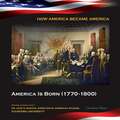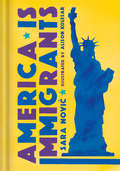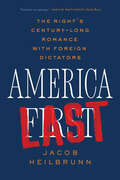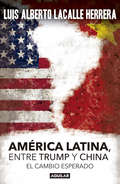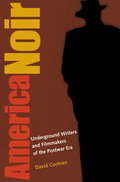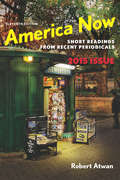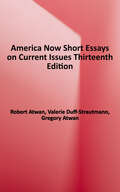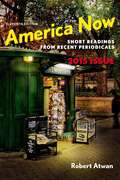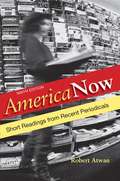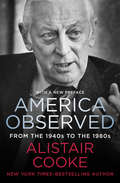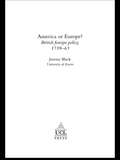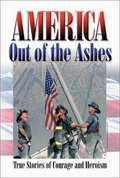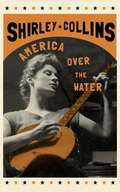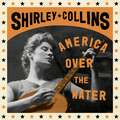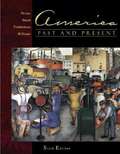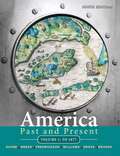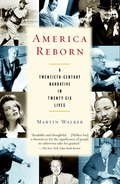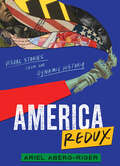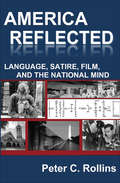- Table View
- List View
America Is Born (How America Became America)
by Constance SharpThe United States' boundaries have expanded over the centuries--and at the same time, Americans' ideas about their country have grown as well. The nation the world knows today was shaped by centuries of thinkers and events. People like Thomas Paine, George Washington, James Madison, and Thomas Jefferson built the foundation of values and ideals on which America still stands. Learning about America's birth will help you understand the country it is today.
America Is Immigrants
by Sara NovicA gorgeously illustrated collection featuring inspiring immigrants from every country in the world, celebrating the incredible range of what it means to be an American This dazzling volume brings American immigrant stories to life in short biographies written by award-winning writer Sara Nović, with charming full-color illustrations by Alison Kolesar. At a time when public debate is focused on who belongs in America, this book honors the crucial contributions of our friends and neighbors who have chosen to make this country their home. Featured within are war heroes and fashion designers, Supreme Court justices and pop stars, athletes and civil rights leaders, as well as: • the doctors who saved Ronald Reagan’s life • the creators of iconic American products like Levi’s, Chevy cars and trucks, and Nathan’s Famous hot dogs • the scientists who contributed to the Manhattan Project • the architects behind landmarks of the American skyline like the World Financial Center in New York City, the Gateway Arch in St. Louis, and the Sears Tower in Chicago • Plus these familiar names from every walk of life: Madeleine Albright • Isabel Allende • Mario Andretti • Desi Arnaz • Isaac Asimov • George Balanchine • Sergey Brin • Gisele Bündchen • Willem de Kooning • Oscar de la Renta • Marlene Dietrich • Albert Einstein • Alfred Hitchcock • Arianna Huffington • Enrique Iglesias • Iman • Grace Jones • Henry Kissinger • Mila Kunis • Hedy Lamarr • Yo-Yo Ma • Miriam Makeba • Pedro Martínez • Joni Mitchell • Sidney Poitier • Wolfgang Puck • Rihanna • Knute Rockne • M. Night Shyamalan • Gene Simmons • Nikola Tesla • the von Trapps • Elie Wiesel • Anna Wintour
America Last: The Right's Century-Long Romance with Foreign Dictators
by Jacob HeilbrunnA leading journalist and public intellectual explains the long, disturbing history behind the American Right’s embrace of foreign dictators, from Kaiser Wilhelm and Mussolini to Putin and Orban. Why do Donald Trump, Tucker Carlson, and much of the far Right so explicitly admire the murderous and incompetent Russian dictator Vladimir Putin? Why is Ron DeSantis drawing from Victor Orbán’s illiberal politics for his own policies as governor of Florida—a single American state that has more than twice the population of Orbán’s entire nation, Hungary? In America Last, Jacob Heilbrunn, a highly respected observer of the American Right, demonstrates that the infatuation of American conservatives with foreign dictators—though a striking and seemingly inexplicable fact of our current moment—is not a new phenomenon. It dates to the First World War, when some conservatives, enthralled with Kaiser Wilhelm II, openly rooted for him to defeat the forces of democracy. In the 1920s and 1930s, this affinity became even more pronounced as Hitler and Mussolini attracted a variety of American admirers. Throughout the Cold War, the Right evinced a fondness for autocrats such as Francisco Franco and Augusto Pinochet, while some conservatives wrote apologias for the Third Reich and for apartheid South Africa. The habit of mind is not really about foreign policy, however. As Heilbrunn argues, the Right is drawn to what it perceives as the impressive strength of foreign dictators, precisely because it sees them as models of how to fight against liberalism and progressivism domestically. America Last is a guide for the perplexed, identifying and tracing a persuasion—or what one might call the “illiberal imagination”—that has animated conservative politics for a century now. Since the 1940s, the Right has railed against communist fellow travelers in America. Heilbrunn finally corrects the record, showing that dictator worship is an unignorable tradition within modern American conservatism—and what it means for us today.
America Latina. Entre Trump y China: El cambio esperado
by Luis Alberto LacalleLa segunda entrega de la saga de Gabriel Keller, un asesino serial montevideano y gris. Otra magnífica novela negra de Hugo Burel. El Uruguay, junto con sus vecinos latinoamericanos, está siendo testigo de una particular e interesante coyuntura histórica: mientras asiste al derrumbamiento de los gobiernos populistas de izquierda, los vecinos del norte eligen un presidente polémico y altisonante, que propone estrategias de repliegue y foco en la producción interna.En este especial contexto, las fuerzas dormidas de China avanzan para expandir su influencia en América Latina, eligiendo al Uruguay como estratégica puerta de entrada. ¿Qué implicancias tendrá para nuestra región este avance? ¿Representa una oportunidad o una amenaza? ¿Qué actitud debería asumir el gobierno y la diplomacia al respecto? El Dr. Luis Alberto Lacalle, apelando a su amplia experiencia como gobernante y líder político, y haciendo gala de un agudo sentido analítico, reflexiona sobre las motivaciones de estos movimientos y aventura propuestas para el mejor futuro del país y la región.
America Noir: Underground Writers and Filmmakers of the Postwar Era
by David CochranIn America Noir David Cochran details how ten writers and filmmakers challenged the social pieties prevalent during the Cold War, such as the superiority of the American democracy, the benevolence of free enterprise, and the sanctity of the suburban family. Rod Serling's The Twilight Zone featured victims of vast, faceless, bureaucratic powers. Jim Thompson's noir thrillers, such as The Grifters, portrayed the ravages of capitalism on those at the bottom of the social ladder. Patricia Highsmith, in The Talented Mr. Ripley, placed an amoral con man in an international setting, implicitly questioning America's fitness as leader of the free world. Charles Willeford's pulp novels, such as Wild Wives and Woman Chaser, depicted the family as a hotbed of violence and chaos.These artists pioneered a detached, ironic sensibility that radically juxtaposed cultural references and blurred the distinctions between "high" and "low" art. Their refusal to surrender to the pressures for political conformity and their unflinching portrayal of the underside of American life paved the way for the emergence of a 1960s counterculture that forever changed the way America views itself.
America Now
by Robert AtwanAmerica Now makes it easy for you to get brief, accessible, and thought-provoking essays into your classroom, with trustworthy, reliable pedagogy and an expert reader's knowledge of what works in the classroom. As series editor for Best American Essays, Robert Atwan constantly scours a wide range of periodicals, bringing to America Now an unrivaled focus on the best writing on today's issues. Instructors tell us that their students want to respond to the essays in the book, and they praise the high- quality reading and writing instruction, critical thinking and reading questions, and model student essays that help them do so. Every reading in America Now is new to this edition, making it truly a book for today's composition course.
America Now: Short Essays on Current Issues, Thirteenth Edition
by Robert AtwanAmerica Now makes it easy for you to bring brief, thought-provoking essays on contemporary topics into your classroom, with reliable pedagogy and an expert reader's knowledge of what works for students. As series editor for The Best American Essays, Robert Atwan constantly scours a wide range of publications, bringing to America Now an unrivaled focus on today’s best writing. Instructors tell us that their students want to respond to the essays in the book, and they praise the high-quality reading and writing instruction, critical thinking and reading questions, and model student essays that help them do so. Over half of the readings in America Now are new to this edition and published since 2018, making it truly a book for today's composition course.
America Now: Short Readings From Recent Periodicals, 11th Edition
by Robert AtwanAmerica Now makes it easy for you to get brief, accessible, and thought-provoking essays into your classroom, with trustworthy, reliable pedagogy and an expert reader's knowledge of what works in the classroom. As series editor for Best American Essays, Robert Atwan constantly scours a wide range of periodicals, bringing to America Now an unrivaled focus on the best writing of today. Instructors tell us that their students want to respond to the essays in the book, and they praise the high-quality reading and writing instruction, critical thinking and reading questions, and model student essays that help them do so. Every reading in America Now is new to this edition, making it truly a book for today's composition course. And now with the new edition, you can meet students where they are: online. To package LaunchPad Solo for Readers and Writers free with America Now, use 978-1-319-01552-7.
America Now: Short Readings from Recent Periodicals
by Robert AtwanWith more than 50 very brief readings -- all new to this edition -- from over 40 very recent periodicals and student newspapers on 12 topics of very current interest,America Nowreflects what students are talking and writing about right now. As series editor ofThe Best American Essays, Robert Atwan constantly scours a wide range of periodicals, bringing toAmerica Nowan unrivaled awareness of the best writing on today's hottest issues -- and the editorial support students need to approach it and to create solid academic writing of their own. To make these issues especially relevant for students, Atwan also explores hundreds of campus newspapers to find the best student writing on current topics. These models by their peers from across the country show students that they, too, can share ideas through their own discussion and writing.
America Observed: From the 1940s to the 1980s
by Alistair CookeThe definitive survey of Alistair Cooke&’s brilliant career as a newspapermanFew journalists have covered the American scene as thoroughly as Alistair Cooke did. In addition to presenting the Sunday-night Letter from America broadcasts for the BBC, Cooke was the Guardian&’s chief US correspondent for more than a quarter century, filing daily dispatches about the former colonies for his British readers.Selected and introduced by Professor Ronald A. Wells, the pieces in America Observed showcase the full range of Cooke&’s omnivorous interests and impressive reportorial skills. From baseball to Billy Graham, Harry S. Truman to Chappaquiddick, he depicts the defining characters and events of the American century with elegance and insight. &“The Untravelled Road&” is a poignant and perceptive snapshot of the civil rights movement in Montgomery, Alabama. &“The Legend of Gary Cooper&” eloquently summarizes the unlikely career of America&’s leading man, and &“A Woman of Integrity&” delivers the news of Marilyn Monroe&’s death with empathy and honesty. &“The Ghastly Sixties&” is a concise, candid, and ultimately inspirational chronicle of that turbulent decade.Remarkably prescient and endlessly entertaining, the journalism collected here is some of the twentieth century&’s finest.
America Or Europe?: British Foreign Policy, 1739-63
by Jeremy Black Professor Jeremy BlackWhy did Britain's position dramatically improve between 1739 and 1763? In this study, the author examines a pivotal period in Britain's rise to power status that culminated in the defeat of France in the struggle for North America in the Seven Years' War. The central themes in this book are the choices between war and peace, America of Europe. Due weight is given to the period of the War of the Austrian Succession 1740-48, when British policy was far from successful and when the major theme was concern with European developments, and to the years of inter-war diplomacy, when the agenda was once again dominated by European developments, specifically the attempt to create a continental system of collective security to off set the Franco-Prussian alliance. Focusing on the diplomacy of the period rather than, as with the majority of works, emphasizing the dominance of a struggle with France for colonial and maritime superiority, new light is thrown on British foreign policy in this period.
America Out of the Ashes
by The Editors at Honor BooksOn September 11, 2001, our nation experienced the horrific acts of terrorism through the tragic events in New York City, Washington D.C., and Pennsylvania. However, the devastating effects were not just confined to these areas as the entire world felt the impact of this attack on freedom and the loss of innocent lives. America Out of the Ashes depicts true stories of courage, hope, and inspiration accompanied by prayers to renew our souls and heal our hearts, to bring us from recovery to restoration. These inspiring stories of heroism and the prayers for god's comfort and provision reveal that with God's help America is rising up out the ashes, stronger and healthier than before.
America Over the Water
by Shirley Collins'Shirley is a time traveller, a conduit for essential human aches, one of the greatest artists who ever lived' Stewart Lee'Without doubt one of England's greatest cultural treasures' Billy BraggIn America Over the Water, celebrated English folksinger Shirley Collins offers an affecting account of her year-long stint as assistant to legendary musical historian and folklorist Alan Lomax. Together, they travelled to Virginia, Kentucky, Alabama, Mississippi, Arkansas, and Georgia, encountering Mississippi Fred McDowell, Muddy Waters and many others, in their tireless work to uncover the traditional music of America's heartland. Blending the personal story of Shirley Collins' relationship with Lomax and offering a unique first-hand account of a country on the brink of the civil rights era, America Over the Water cuts right to the heart of the blues in a fascinating account of Collins' and Lomax's ground-breaking journey across the southern states of the USA to record the music that started it all. Originally published over fifteen years ago, this definitive edition includes a new introduction by Shirley Collins.
America Over the Water
by Shirley Collins'Shirley is a time traveller, a conduit for essential human aches, one of the greatest artists who ever lived' Stewart Lee'Without doubt one of England's greatest cultural treasures' Billy BraggIn America Over the Water, celebrated English folksinger Shirley Collins offers an affecting account of her year-long stint as assistant to legendary musical historian and folklorist Alan Lomax. Together, they travelled to Virginia, Kentucky, Alabama, Mississippi, Arkansas and Georgia, discovering Mississippi Fred McDowell and many others, in their tireless work to uncover the traditional music of America's heartland. Blending the personal story of Shirley Collins' relationship with Lomax and offering a unique first-hand account of a country on the brink of the civil rights era, America Over the Water cuts right to the heart of the blues in a fascinating account of Collins' and Lomax's ground-breaking journey across the southern states of the USA to record the music that started it all. Originally published over fifteen years ago, this definitive edition includes a new introduction by Shirley Collins.
America Over the Water
by Shirley CollinsIn America Over the Water, celebrated English folksinger Shirley Collins offers an affecting account of her year-long stint as assistant to legendary musical historian and folklorist Alan Lomax. Together, they travelled to Virginia, Kentucky, Alabama, Mississippi, Arkansas and Georgia, discovering Mississippi Fred McDowell and many others, in their tireless work to uncover the traditional music of America's heartland. Blending the personal story of Shirley Collins' relationship with Lomax and offering a unique first-hand account of a country on the brink of the civil rights era, America Over the Water cuts right to the heart of the blues in a fascinating account of Collins' and Lomax's ground-breaking journey across the southern states of the USA to record the music that started it all. Originally published over fifteen years ago, this definitive edition includes a new introduction by Shirley Collins.
America Past and Present (6th edition)
by T. H. Breen Robert A. Divine George M. Fredrickson R. Hal WilliamsNew edition of a text that combines political, social, economic, and cultural history in a narrative about America's history, illuminating not only national development but also human choice and action. Divine (U. of Texas), T. H. Breen (Northwestern U.), George M. Fredrickson (Stanford U.) and R. Hal Williams (Southern Methodist U.) have included nine new essays that explore issues of diversity as well as landmark court cases and their significance; expanded coverage of Native American societies before contact with Europeans; and current considerations of the last two decades. Contains many color and b&w illustrations, and a comparative chronology insert.
America Past and Present (8th edition)
by Robert A. DivineAmerica Past and Present integrates the social and political dimensions of American history into one rich chronological narrative, providing students with a full picture of the scope and complexity of the American past.
America Past and Present (Revised 6th Edtion, AP Edition)
by T. H. Breen Robert A. Divine George M. Fredrickson R. Hal WilliamsThe sixth edition of America Past and Present is a major revision that strives to achieve the goal of previous editions: to present a clear, relevant, and balanced history of the United States as an unfolding story of national development from the days of the earliest inhabitants to the present.
America Past and Present (Revised 7th Edtion, AP Edition)
by H. W. Brands T. H. Breen Robert A. Divine George M. Fredrickson R. Hal Williams Ariela J. GrossThe seventh edition of America Past and Present is a major revision that strives to achieve the shared goal of the previous editions: to present a clear, relevant, and balanced history of the United States as an unfolding story of national development, from the days of the earliest inhabitants to the present.
America Past and Present, Volume 1: To 1877
by H. W. Brands T. H. Breen Robert A. Divine George M. Fredrickson R. Hal Williams Ariela J. GrossFor introductory-level survey courses in American History. Focused on the Story of American History. America Past and Present integrates the social and political dimensions of American history into one rich chronological narrative, providing students with a full picture of the scope and complexity of the American past. Written in a lively narrative style by award-winning historians, America Past and Present tells the story of all Americans--elite and ordinary, women and men, rich and poor, white majority and minorities. The authors, all active, publishing, and award-winning historians, bring history to life for introductory students in America Past and Present.
America Past and Present: AP Edition (9th Edition)
by Robert A. DivineAmerica Past and Present, AP Edition, Ninth Edition strives to achieve the shared goal of the previous editions: to present a clear, relevant, and balanced history of the United States as an unfolding story of national development, from the days of the earliest inhabitants to the present. We emphasize the story because we strongly believe in the value of historical narrative in providing a vivid sense of the past. In each chapter, we seek to blend the excitement and drama of the American experience with insights about the social, economic, and cultural issues that underlie it
America Reborn: A Twentieth-century Narrative in Twenty-six Lives
by Martin WalkerHere is the story of America in the twentieth century as told through the lives of twenty-six of its most remarkable and historically crucial men and women.The people Martin Walker has chosen to portray are presidents, industrialists, artists, thinkers, entertainers, soldiers, spies, criminals, and evangelists, among others, and he makes the life of each individual serve as a framework for a discussion of the nation as a whole in a century when it was reinventing itself.Through Theodore Roosevelt, Walker examines America's ambition; through Woodrow Wilson, our idealism; through FDR, our triumph on the world stage; through Richard Nixon, our retreat into cynicism; through Bill Clinton, globalization and controversy about the right way to use America's unprecedented power.In Henry Ford he finds the creator of both the mass-market product and the mass-market consumer, and in Walt Disney, the revolutionizer not only of America's entertainment but also of the world's. William Boeing is the innovator who spurs the behemoth of American aviation; Walter Reuther defines labor's struggles; George C. Marshall represents the spread of America's economic genius in a war-ravaged Europe.In the lives of Duke Ellington, Frank Lloyd Wright, Katharine Hepburn, and John Steinbeck, Walker traces America's far-reaching cultural influences. Babe Ruth leads to a consideration of the role of sports in our society; William F. Buckley, Jr., to a discussion of conservatism; Martin Luther King, Jr., to matters of race; Betty Friedan to the shifting role of women; Billy Graham to an examination of religion; Emma Goldman to minority viewpoints and dissent; Black Jack Pershing to the place of the military; Lucky Luciano to crime and corruption; Albert Einstein to immigration; Richard Bissell to spies and the intelligence network; Alan Greenspan to finance and banking; and Winston Churchill to the American diaspora.At once intimate and wide-ranging, America Reborn is an altogether engrossing work of narrative history.From the Hardcover edition.
America Redux: Visual Stories from Our Dynamic History
by Ariel Aberg-RigerA critical, unflinching cultural history and fierce beacon of hope for a better future, America Redux is a necessary and galvanizing read. What are the stories we tell ourselves about America? How do they shape our sense of history, cloud our perceptions, inspire us? America Redux explores the themes that create our shared sense of American identity and interrogates the myths we’ve been telling ourselves for centuries. With iconic American catchphrases as chapter titles, these twenty-one visual stories illuminate the astonishing, unexpected, sometimes darker sides of history that reverberate in our society to this very day—from the role of celebrity in immigration policy to the influence of one small group of white women on education to the effects of “progress” on housing and the environment, to the inspiring force of collective action and mutual aid across decades and among diverse groups. Fully illustrated with collaged archival photographs, maps, documents, graphic elements, and handwritten text, this book is a dazzling, immersive experience that jumps around in time and will make you view history in a whole different light.
America Reflected: Language, Satire, Film, and the National Mind
by Peter C. RollinsEclectic criticism and insightful observations from “one of the most respected cultural historians working today” (Ronald A. Wells, Professor of History Emeritus, Calvin College). “From cowboy philosopher Will Rogers to popular perceptions of two world wars and Vietnam, from the history of language to the language of film and television, Peter Rollins has devoted his career to exploring the intriguing ways in which the creative impulse both shapes and reflects American culture. His observations are fresh, illuminating and of enduring value.” —John E. O’Connor, co-founder/editor of Film & History: An Interdisciplinary Journal of Film and Television Studies“Examines the roles of language, satire, and film in reflecting the American consciousness through such diverse sources as Orestes Brownson, Benjamin Lee Whorf, Will Rogers, and Hollywood. Readers of America Reflected are in for a delightful voyage as they travel through American history and culture with Peter Rollins as their guide providing personal and scholarly insights into the shaping of the American mind.” —Ron Briley, editor of The Politics of Baseball: Essays on the Pastime and Power at Home and Abroad“Even those who have known and admired Peter Rollins’s acclaimed works will here find enlightening surprises. Epistemology, language theory, war’s polemics, filmed history, and an array of significant creators of American culture are all elegantly displayed. This book will make you a wiser person and charm you while it does it.” —John Shelton Lawrence, Emeritus Professor of Philosophy, Morningside College“Two decades ago I was privileged to work on a book, America Observed, with Alistair Cooke. Now we have America Reflected by Peter Rollins . . . Not only does Rollins make good observations about our lives and times, his reflections on a diverse set of subjects helps us to see the meanings of our observations.” —Ronald A. Wells, Professor of History Emeritus, Calvin College “Rollins gathers together glimpses of our shared worlds, so that we may observe their interconnections across media, genres, and time. From down-home values and front-porch philosophy, to tales of wars and chronicles of lives, the subjects considered here are all part of the stories we tell about ourselves and our social worlds.” —Cynthia J. Miller, President, Literature/Film Association
America Revised: History Schoolbooks in the Twentieth Century
by Frances FitzgeraldA volume about American history, and the analytical capabilities on the manner in which we have understood our own history. FitzGerald traces the evolution of the development of history textbooks and the debates over them through the years.
